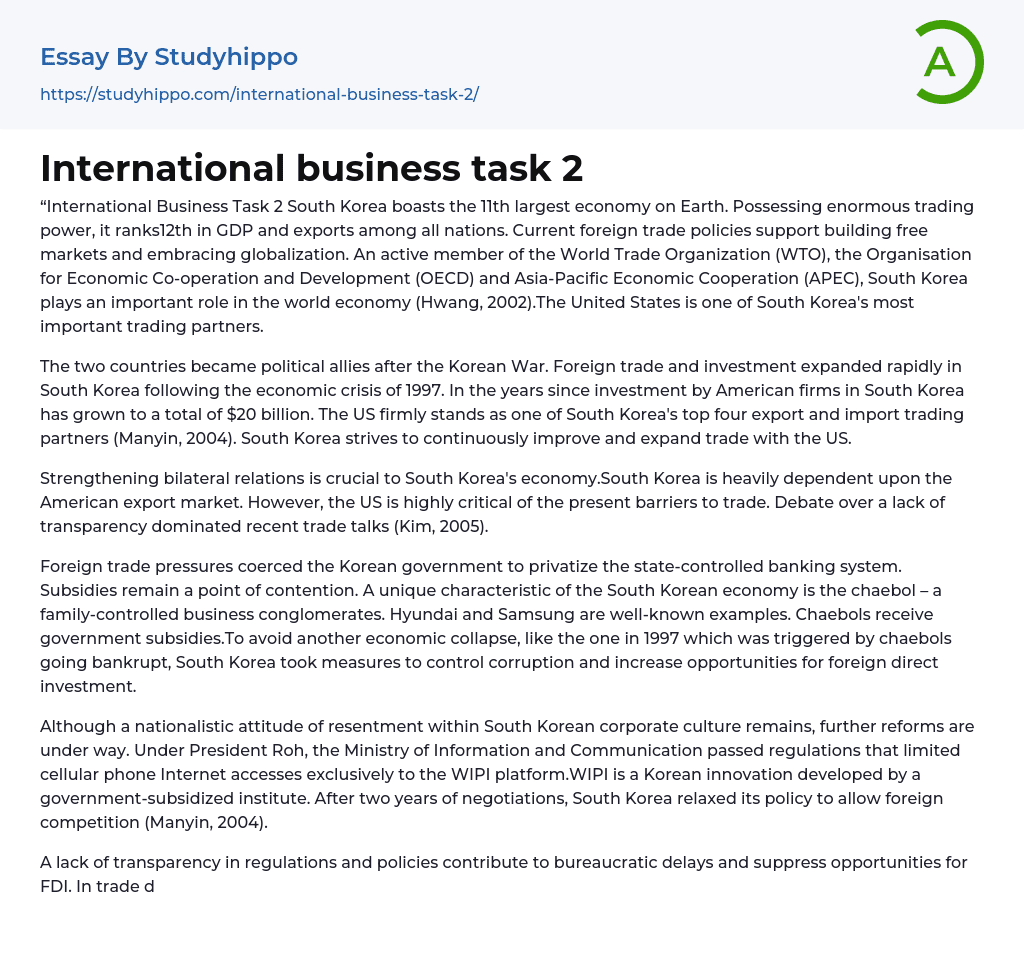“International Business Task 2 South Korea boasts the 11th largest economy on Earth. Possessing enormous trading power, it ranks12th in GDP and exports among all nations. Current foreign trade policies support building free markets and embracing globalization. An active member of the World Trade Organization (WTO), the Organisation for Economic Co-operation and Development (OECD) and Asia-Pacific Economic Cooperation (APEC), South Korea plays an important role in the world economy (Hwang, 2002).The United States is one of South Korea's most important trading partners.
The two countries became political allies after the Korean War. Foreign trade and investment expanded rapidly in South Korea following the economic crisis of 1997. In the years since investment by American firms in South Korea has grown to a total of $20 billion. The US firmly stands as one of South Korea's top four export and import trading partners (Manyin, 2004). South Ko
...rea strives to continuously improve and expand trade with the US.
Strengthening bilateral relations is crucial to South Korea's economy.South Korea is heavily dependent upon the American export market. However, the US is highly critical of the present barriers to trade. Debate over a lack of transparency dominated recent trade talks (Kim, 2005).
Foreign trade pressures coerced the Korean government to privatize the state-controlled banking system. Subsidies remain a point of contention. A unique characteristic of the South Korean economy is the chaebol – a family-controlled business conglomerates. Hyundai and Samsung are well-known examples. Chaebols receive government subsidies.To avoid another economic collapse, like the one in 1997 which was triggered by chaebols going bankrupt, South Korea took measures to control corruption and increase opportunities for foreign direct investment.
Although a nationalistic attitude of resentment
within South Korean corporate culture remains, further reforms are under way. Under President Roh, the Ministry of Information and Communication passed regulations that limited cellular phone Internet accesses exclusively to the WIPI platform.WIPI is a Korean innovation developed by a government-subsidized institute. After two years of negotiations, South Korea relaxed its policy to allow foreign competition (Manyin, 2004).
A lack of transparency in regulations and policies contribute to bureaucratic delays and suppress opportunities for FDI. In trade disputes, the US considers the tariffs on agricultural products most forbidding. On average, South Korea levies a 66% tariff on agricultural imports. Compared to other members of OECD, South Korea has the least liberalized agricultural market.Quotas also impede the import of foreign goods. For instance, South Korea requires movie theatres to fulfill screen quotas that limit the amount of time that imported films may be viewed.
Furthermore, the US accused the South Korean government of manipulating foreign currency markets (Manyin, 2004). As trade talks continue, South Korea promises liberalization of markets and minimized intervention. President Roh hopes to enact a Free Trade Agreement with the US. First, South Korea must eliminate present barriers to fair and equal economic freedom (Kim, 2005).
A bilateral FTA will fail until transparency issues, subsidies, tariffs, quotas and currency manipulation are addressed. South Korean policy makers maintain that their nation is committed to free and open trade in the global market (Hwang, 2002). Heavily dependent upon its export market, South Korea promises continued liberalization and cooperation with foreign trading partners.
References
- Hwang, Doo-yun, (2001, Autumn). Korea’s International Trade Policy in the Global Age. East Asian Review, 13(3), pp 3-20.
- Retrieved November 27, 2005 from http://www. ieas. or.
kr/vol13_3/13_3_1. pdf Kim, Anthony B.
- Asset essays
- Capital market essays
- Day Trading essays
- Depreciation essays
- Discounted Cash Flow essays
- Foreign Direct Investment essays
- Funds essays
- Futures Trading essays
- Internal Rate Of Return essays
- Million essays
- Revenue essays
- American Dream essays
- Barriers To Entry essays
- Capitalism essays
- Central Bank essays
- Compensation essays
- Consumerism essays
- Economic Development essays
- Economic Growth essays
- Economic Inequality essays
- Economic System essays
- Economy essays
- Employment essays
- Export essays
- Finance essays
- Free Trade essays
- Gross Domestic Product essays
- Human Development essays
- Income Inequality essays
- Industry essays
- Inflation essays
- International Business essays
- International Trade essays
- Macroeconomics essays
- Materialism essays
- Max Weber essays
- Microeconomics essays
- Minimum Wage essays
- Monetary Policy essays
- Monopoly essays
- Pricing essays
- Profit essays
- Recession essays
- resources essays
- Taxation essays
- Trade essays
- Unemployment essays
- Warehouse essays
- World economy essays
- Activism essays




